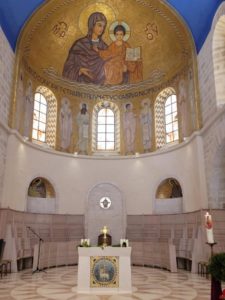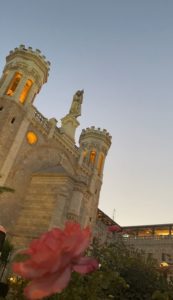The people of Israel viewed wisdom as a means of communicating with Yahweh. Devout Jews used not only the Torah but also the Psalms, the Book of Proverbs, and the other wisdom writings in their prayers. Unlike the objective culture of Greece and Rome, they addressed Yahweh in prayer as a child to their father, not through myths and fear like the pagans.

Dormition Abbey, Jerusalem
Wisdom operates in the realm of personal intimacy and, therefore, through habitual knowledge in freedom, is capable of discerning the most sublime. Mary, therefore, always acted in freedom.
We might think that Mary had no difficulty in her relationship with God because she was conceived without sin, but this is not true. On the contrary, she had to constantly renew her free surrender to God in every moment of her life, given the immensity of the recipient of her love. She had to constantly reaffirm her freedom in order to reach Calvary and “stand” at the moment of the crucifixion, which means being in the fullness of redemptive love with her Son.
Understanding the mystery of Redemption is not an easy task for us because, being born with sin in our nature, we do not fully comprehend the damage it causes. However, Mary “saw” this difference with great clarity because she was far removed from sin.
“On the other hand, Mary was, in a way, assumed by the Word. Therefore, she was the living creature who had to learn the most, precisely so as not to fall short of her union with her Son. This learning process involved the growth of her charity to the point of forgetting completely about herself. If we look closely, this heroic love is superior to any human love.” (Leonardo Polo – Epistemología, Creación y Divinidad. Ch. 7, 7. La madre de Cristo).
We have a fact that supports this. Mary, at the foot of the cross, forgives those who are crucifying Jesus in front of her, those who insult her Son in front of her. In no case does she show any rebellion; instead, she exhibits forgiveness. She knows how great the goodness of her Son is and deeply feels the contempt with which men treat Him. She knows that what is happening at that moment is not the execution of a man, but the beginning of a new life over which death will no longer have dominion.
At the end of her life, Mary is a Hebrew widow who has been tempered in pain every moment of her life and has freely accepted and loved it. She has never broken the personal relationship with her Father God, nor with her Son, nor with the Holy Spirit.
When the young Mary meets Joseph, she does not know that she will be the mother of the Messiah. It is Joseph who discovers that this young woman who desires to live in virginity could be the virgin described in the book of Isaiah. It is Joseph who shows her, through the prophets, that she may be the chosen one. So, they fall in love with wisdom in Wisdom.

Notre Dame of Jerusalem Center
And when her Son says to her from the cross, “Woman, behold your son” (Jn 19:26), she answers nothing. She accepts it, just as when Joseph tells her that they must flee to Egypt at night, and she keeps quiet. This acceptance only perseveres due to her immense personal love for her Father God, which she expressed when consenting to her motherhood. It is love as a gift.
Thus, Mary, identified with her Son, grew in age, wisdom, and grace before God and before men.
By Domingo Aguilera Pascual is the author of “Las Relaciones de María” and “Las Relaciones de José” and he also publishes a blog under www.amigosdelavirgen.org
